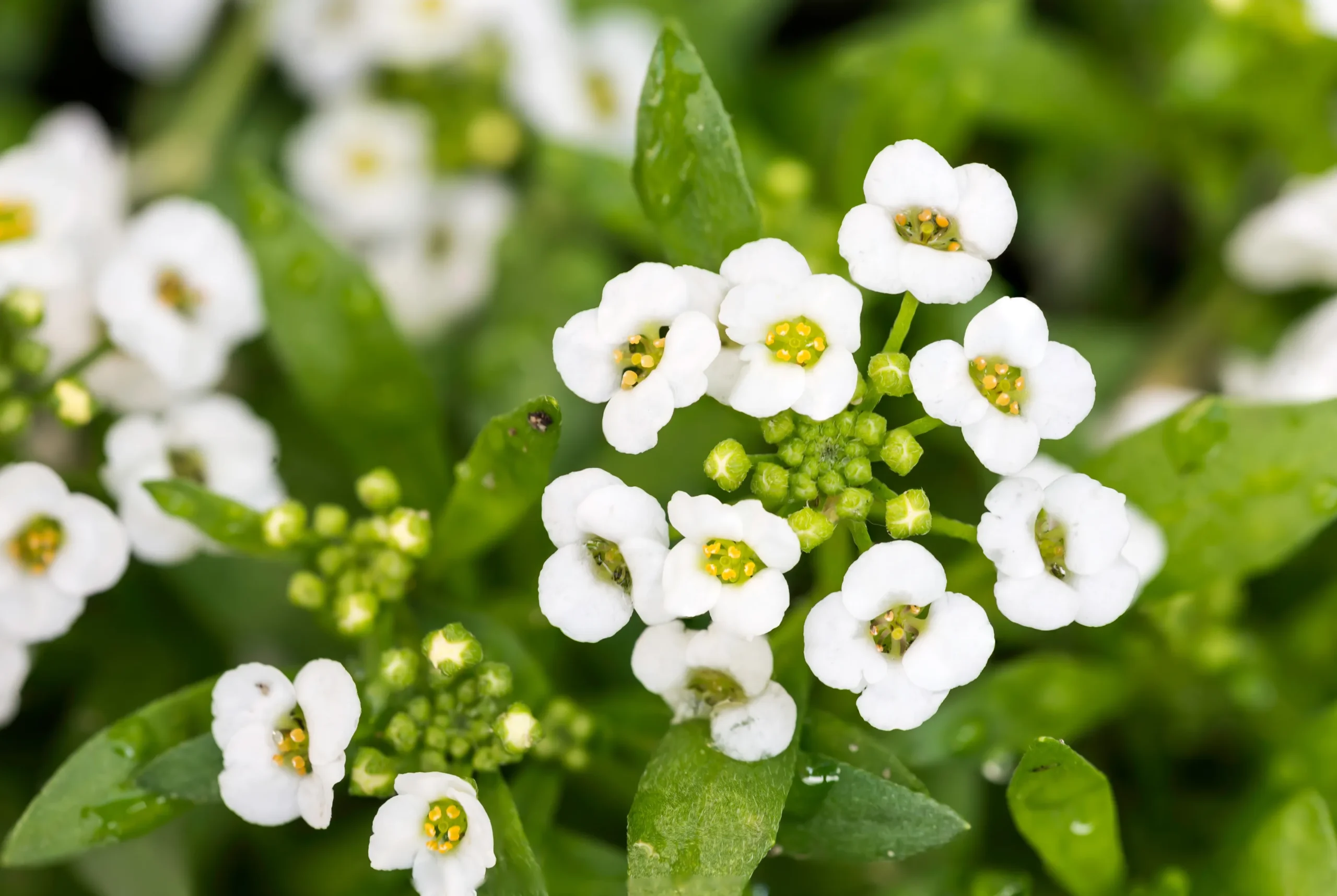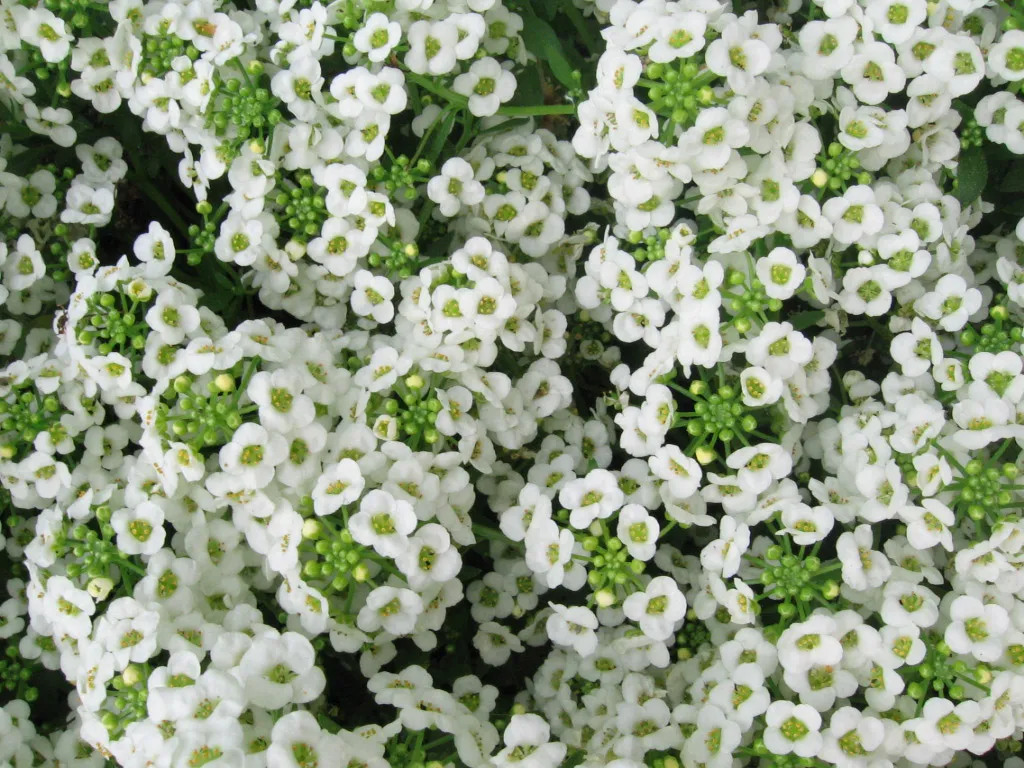Family: Alyssum
Type: Annual
Other Common Name: Sweet Alyssum, Alyssum maritimum, Sweet Alison

Sweet Alyssum, known scientifically as Lobularia maritima, is a delightful, low-growing annual that enchants with its tiny, fragrant flowers and enduring bloom time. Flourishing in a range of colors from white to pink, purple, and yellow, this plant spreads a carpet of vibrant hues and a sweet, honey-like fragrance throughout your garden. Its compact nature and quick growth make it an ideal choice for filling in gaps, edging borders, and spilling gracefully from containers.
Thriving in full sun to partial shade, Sweet Alyssum is remarkably easy to grow and maintain, making it a favorite among both novice and experienced gardeners. It prefers well-draining soil but can adapt to various ground conditions, showing resilience in coastal areas and tolerance to drought once established. This plant’s ability to attract pollinators such as bees and butterflies adds an extra layer of life and vibrancy to your garden ecosystem.
Integrating Sweet Alyssum into your landscape not only brings beauty and fragrance but also offers a practical solution for erosion control on slopes and banks, thanks to its dense, mat-forming growth. Whether used to enhance the visual appeal of walkways, garden beds, or hanging baskets, Sweet Alyssum creates a stunning visual impact with minimal effort, blooming profusely from spring through fall.
Hardiness Zone: 5a-9b
Deer Resistant: Yes
Pet Friendly: Yes
Moisture Preference: Moist
Sun Needs: Full sun to partial shade
Growth Rate: Fast
Average Height (feet): 0.5
Average Spread (feet): 3
Average Life Span (years): 1
Form: Trailing
Flower Color: White
Flower Shape: Star
Bloom Season: From mid spring to mid fall
Foliage Color: Green
Foliage Shape: Narrow
Incorporating Sweet Alyssum into your garden design can instantly elevate the aesthetic and sensory appeal of your outdoor space. Planting it along walkways and garden paths invites visitors to enjoy its delicate fragrance up close, while its low growth habit ensures that it complements, rather than competes with, neighboring plants. Its rapid spread and flowering capability make it an excellent choice for quickly covering bare spots with a blanket of blooms.
Sweet Alyssum pairs beautifully with other annuals and perennials, creating a layered look of varying heights, textures, and colors. Combining it with taller flowers or ornamental grasses allows its dense foliage and flowers to serve as a living mulch, reducing weed growth and maintaining soil moisture. In container gardens, let Sweet Alyssum cascade over the edges for a soft, romantic effect that enhances the overall composition.
For a dynamic garden that changes with the seasons, use Sweet Alyssum as a ground cover in spring bulb beds, where it can hide the fading foliage of tulips and daffodils. Its flexibility in design and application makes it a versatile addition to formal gardens, cottage gardens, and even urban balconies, providing continuous color and fragrance.

Sweet Alyssum's informal growth and profuse blooms complement the relaxed, abundant look of cottage gardens, adding charm and sweetness.
Attracting pollinators is key in butterfly gardens, and Sweet Alyssum is a magnet for these beneficial insects, supporting biodiversity.
Its tolerance for salty conditions and drought resistance makes Sweet Alyssum a practical and beautiful choice for seaside landscapes.
Edge garden beds with Sweet Alyssum to create a defined, fragrant border that invites closer inspection and enjoyment.
Combine it with succulents in a rock garden, where its soft texture contrasts with the hard lines of the rocks and succulent leaves.
Plant Sweet Alyssum in a hanging basket or window box, where its cascading blooms can be appreciated at eye level, adding beauty to any outdoor living area.
Select our pre-made garden layouts to create a landscape that’s uniquely yours. Simple, smart, and customizable!
As temperatures warm, Sweet Alyssum begins to bloom, covering the landscape in a vibrant tapestry of color and scent.
Throughout the summer, Sweet Alyssum continues to flower abundantly, with regular deadheading encouraging more blooms.
In fall, Sweet Alyssum remains resilient, providing color and fragrance in the garden until the first frost.
In milder climates, Sweet Alyssum may persist through winter, though it typically dies back and can be replanted in spring for another year of beauty.
Sweet Alyssum thrives in locations that receive full sun to partial shade, making it versatile for various garden spots.
It performs best in full sun but will also grow well in partial shade, especially in hotter climates.
This plant prefers well-draining soil but is quite adaptable to different soil types, from sandy to clay.
Plant Sweet Alyssum 6 to 8 inches apart to allow for their spread, creating a continuous carpet of blooms.
The best time to plant Sweet Alyssum is in the spring after the last frost or in the fall in warmer climates.
Sow seeds directly into the garden or plant transplants shallowly, covering them with a thin layer of soil and water gently.
Water regularly to keep the soil moist, especially during dry spells, but avoid waterlogging.
Apply a balanced liquid fertilizer monthly during the growing season to encourage vigorous growth and blooming.
Deadheading is not necessary, but a light trimming can encourage a bushier growth and prolong flowering.
Plant or sow seeds, water well to establish, and begin monthly fertilization as new growth appears.
Continue regular watering and monthly fertilizing, and trim if necessary to maintain shape and encourage new blooms.
In warmer zones, Sweet Alyssum may continue to bloom. Reduce watering and stop fertilizing as the plant prepares for winter.
In colder regions, Sweet Alyssum will die back. Clear away dead foliage, and mulch to protect the soil if desired.
Sweet Alyssum can tolerate light frosts, but heavy frost will cause it to die back. In milder climates, it may overwinter and reseed in spring.
While Sweet Alyssum can self-seed prolifically, it is not typically considered invasive due to its easy removal and control.
Allow some of the final blooms to go to seed in late summer or fall. The seeds will drop and potentially germinate the following spring.
Sign up below to get exclusive deals, discounts, and new plant collections—delivered straight to your inbox! Plus, stay inspired with the latest gardening tips, landscaping trends, and DIY garden ideas. Start growing with us today!
A big thank you for subscribing to the PBN Design newsletter.
We're thrilled to have you join our community. Get ready for exciting updates, insightful content, and more delivered straight to your inbox.
Stay tuned!
Go backA big thank you for subscribing to the PBN Design newsletter.
We're thrilled to have you join our community. Get ready for exciting updates, insightful content, and more delivered straight to your inbox.
Stay tuned!
Go back